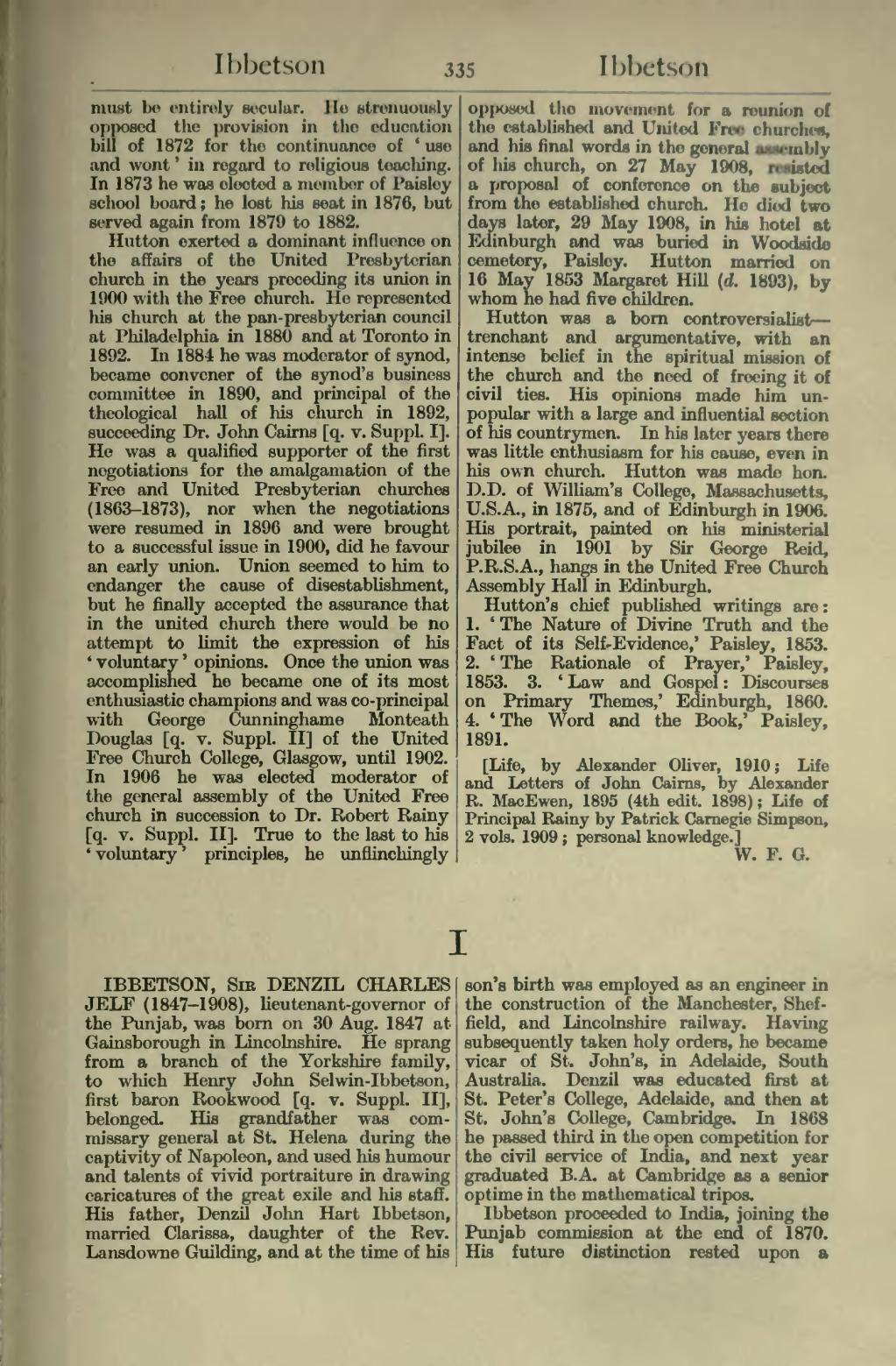must be entirely secular. He strenuously opposed the provision in the education bill of 1872 for the continuance of 'use and wont' in regard to religious teaching. In 1873 he was elected a member of Paisley school board; he lost his seat in 1876, but served again from 1879 to 1882.
Hutton exerted a dominant influence on the affairs of the United Presbyterian church in the years preceding its union in 1900 with the Free church. He represented his church at the pan-presbyterian council at Philadelphia in 1880 and at Toronto in 1892. In 1884 he was moderator of synod, became convener of the synod's business committee in 1890, and principal of the theological hall of his church in 1892, succeeding Dr. John Cairns [q. v. Suppl. I], He was a qualified supporter of the first negotiations for the amalgamation of the Free and United Presbyterian churches (1863-1873), nor when the negotiations were resumed in 1896 and were brought to a successful issue in 1900, did he favour an early union. Union seemed to him to endanger the cause of disestablishment, but he finally accepted the assurance that in the united church there would be no attempt to limit the expression of his 'voluntary' opinions. Once the union was accomplished he became one of its most enthusiastic champions and was co-principal with George Cunninghame Monteath Douglas [q. v. Suppl. II] of the United Free Church College, Glasgow, until 1902. In 1906 he was elected moderator of the general assembly of the United Free church in succession to Dr. Robert Rainy [q. v. Suppl. II]. True to the last to his 'voluntary' principles, he unflinchingly opposed the movement for a reunion of the established and United Free churches, and his final words in the general assembly of his church, on 27 May 1008, resisted a proposal of conference on the sabjeot from the established church. He died two days later, 29 May 1908, in his hotel at Edinburgh and was buried in Woodride cemetery. Paisley. Hutton married on 16 May 1853 Margaret Hill (d. 1893), by whom he had five children.
Hutton was a born controversialist—trenchant and argumentative, with an intense belief in the spiritual mission of the church and the need of freeing it of civil ties. His opinions made him unpopular with a large and influential section of his countrymen. In his later years there was little enthusiasm for his cause, even in his own church. Hutton was made hon. D.D. of William's College, Massachusetts, U.S.A., in 1875, and of Edinburgh in 1906. His portrait, painted on his ministerial jubilee in 1901 by Sir George Reid, P.R.S.A., hangs in the United Free Church Assembly Hall in Edinburgh.
Hutton's chief published writings are:
- 'The Nature of Divine Truth and the Fact of its Self-Evidence,' Paisley, 1853.
- 'The Rationale of Prayer,' Paisley, 1853.
- 'Law and Gospel: Discourses on Primary Themes,' Edinburgh, 1860.
- 'The Word and the Book,' Paisley, 1891.
[Life, by Alexander Oliver, 1910; Life and Letters of John Cairns, by Alexander R. MacEwen, 1895 (4th edit. 1898); Life of Principal Rainy by Patrick Carnegie Simpson, 2 vols. 1909; personal knowledge.]
I
IBBETSON, Sir DENZIL CHARLES JELF (1847–1908), lieutenant-governor of the Punjab, was born on 30 Aug. 1847 at Gainsborough in Lincolnshire. He sprang from a branch of the Yorkshire family, to which {{DNB lkpl|year=12|Selwin-Ibbetson, Henry John|Henry John Selwin-Ibbetson, first baron Rookwood [q. v. Suppl. II], belonged. His grandfather was commissary general at St. Helena during the captivity of Napoleon, and used his humour and talents of vivid portraiture in drawing caricatures of the great exile and his staff. His father, Denzil John Hart Ibbetson, married Clarissa, daughter of the Rev. Lansdowne Guilding, and at the time of his son's birth was employed as an engineer in the construction of the Manchester, Sheffield, and Lincolnshire railway. Having subsequently taken holy orders, he became vicar of St. John's, in Adelaide, South Australia. Denzil was educated first at St. Peter's College, Adelaide, and then at St. John's College, Cambridge. In 1868 he passed third in the open competition for the civil service of India, and next year graduated B.A. at Cambridge as a senior optime in the mathematical tripos.
Ibbetson proceeded to India, joining the Punjab commission at the end of 1870. His future distinction rested upon a
